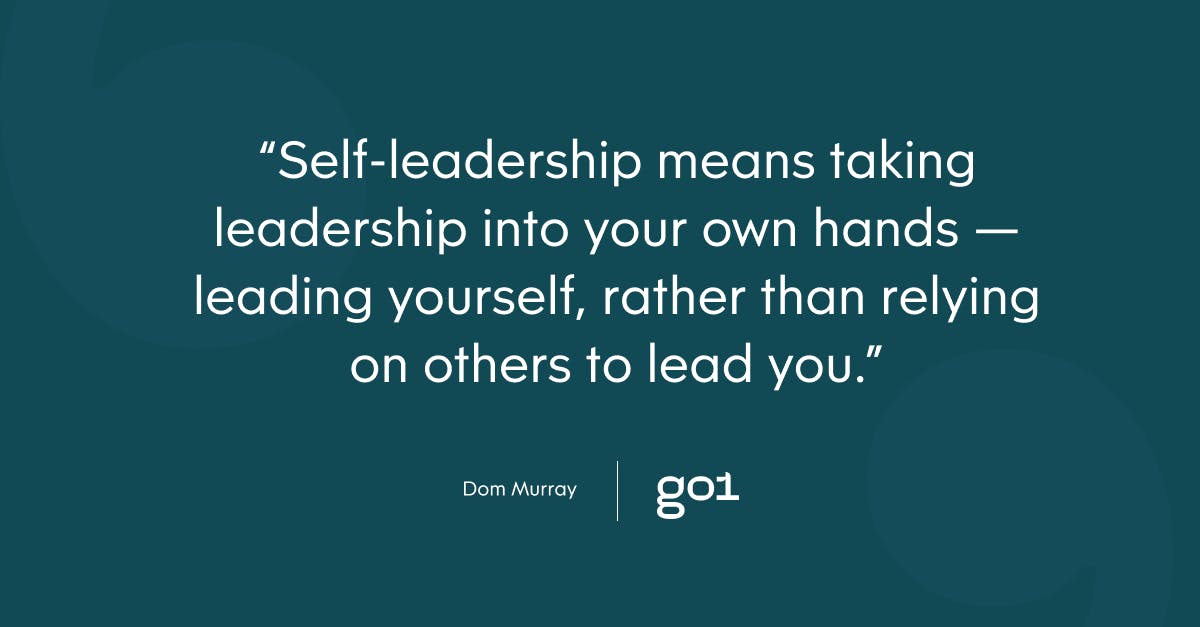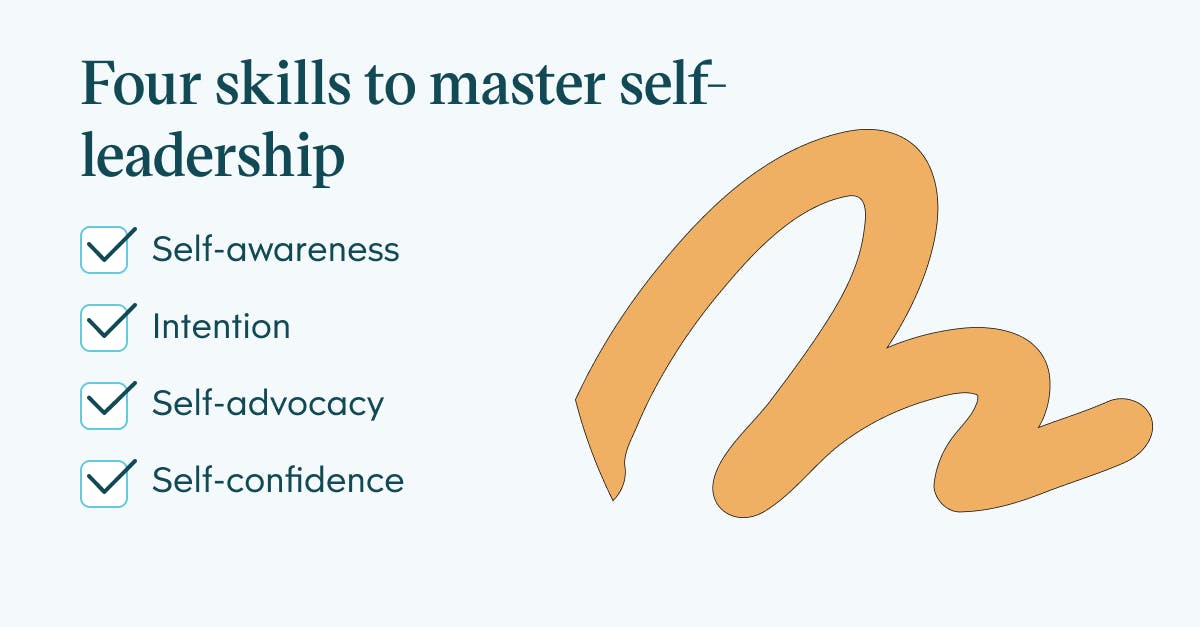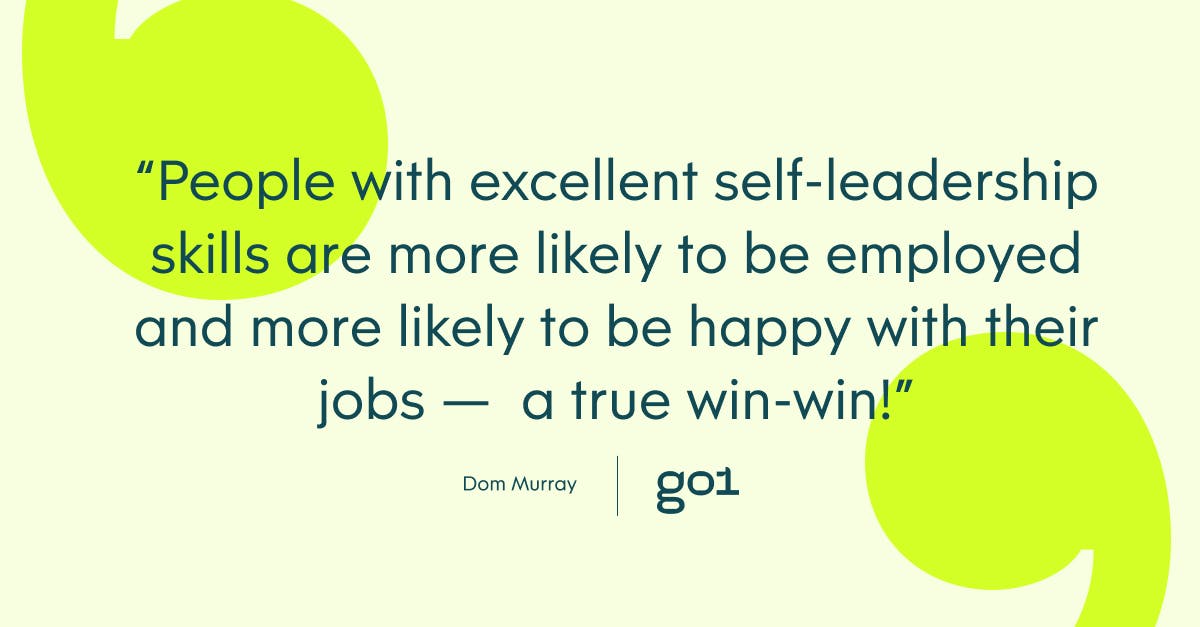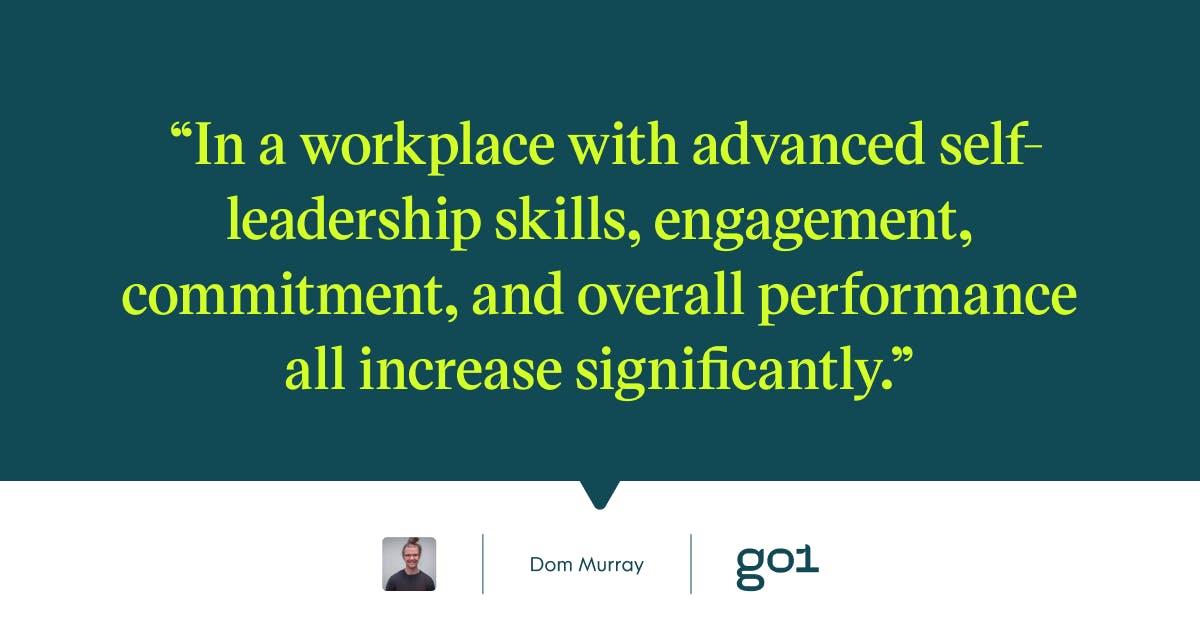
How will ‘self-leadership’ influence the future of work?

In an era of rampant change and uncertainty, strong organisational leadership is more important than ever. With adaptability at a premium, businesses are crying out for secure, steady leadership to guide them through these restless waters. Therefore, it should be alarming that 77% of organisations currently face leadership gaps, while only 14% of CEOs say they have the leadership talent they need to grow their businesses. Further, just 48% of people think their company’s leadership is high quality. While figures paint a concerning picture of the state of top-level leadership, they also offer vital insights into an emerging trend: self-leadership.
While widespread leadership gaps are concerning, they also present opportunities for people with self-leadership skills to get ahead in the future of work. Let’s look at one more telling statistic to demonstrate this: 63% of millennials don't think their leadership skills are being developed properly. So, employees have said enough is enough and taken leadership into their own hands. As they say, if you want something done right, do it yourself. Enter: the era of self-leadership.
With this in mind, we thought now was the perfect time to analyse self-leadership by casting an eye over how this trend will influence the future of work. We’ll start by asking ‘what is self-leadership?’ before moving on to essential self-leadership skills and finally examining five need-to-know facts about self-leadership.
This article is the second in a series of four, stemming from our recent deep dive into the foundational skills you’ll need in 2022. For the rest of this month, we’ll detail the interpersonal, leadership, digital, and cognitive skills you’ll need to get ahead in 2022 and beyond. Be sure to check back regularly to stay up to date with the skills that define the future of work, and, if you haven’t already, check out our blog on interpersonal skills, which kicked this series off.
What is self-leadership?
On a basic level, self-leadership is a fairly self-explanatory term. Self-leadership means taking leadership into your own hands — leading yourself, rather than relying on others to lead you. While this serves well as a basic definition, in practice, the term encompasses many nuances.

According to Lead Grow Develop, self-leadership is “the deliberate action to influence one's thinking and action to achieve an objective…self-leadership teaches one how to manage themselves in complex and uncertain situations. To lead a team or group of people, one must be good at self-leadership.” They elaborate, explaining that mastering self-leadership requires four main skills: intention, self-awareness, self-advocacy, and self-confidence.

Accordingly, Forbes has dubbed self-leadership “the most important form of leadership”. And it shows. A massive 69% of employees say they would work harder if leaders recognised their efforts. In contrast, companies with high employee engagement are 22% more profitable. It should be no surprise that robust self-leadership programs play a central role in employee engagement.
It also makes sense that developing capable organisational leaders first requires self-leadership skills. As Birkman puts it, “traditional ‘leaders’ can not be truly successful at managing or leading others until they can effectively manage and lead themselves.”
Notably, 'self-leadership’ is not a new term. Rather, it was coined in 1983 by Professor Charles C. Manz. Prof. Manz defined self-leadership as a “comprehensive self-influence perspective that concerns leading oneself toward performance of naturally motivating tasks as well as managing oneself to do work that must be done but is not naturally motivating.”
Building upon this definition in 2019, Professor Marieta Du Plessis took a more modern approach, recognising that self-leadership could influence all walks of life, not just business. She explained that “positive self-leadership refers to the capacity to identify and apply one’s signature strengths to initiate, maintain, or sustain self-influencing behaviours.” Similarly, Positive Psychology says self-leadership involves “what we do, why we do it, and how we do it.”
In many ways, self-leadership is one of the most important but neglected life skills. Too often, people sit back and allow others to make decisions for them or quietly follow paths with which they disagree. While this is sometimes unavoidable, self-leadership and self-advocacy always come in handy. After all, if you aren’t looking out for your growth and development, who will?
Essential self-leadership skills
Self-leadership includes many skills you would expect from a traditional leader — motivation, management, emotional intelligence, decision-making, a vision for the future, self-awareness, and a growth mindset. The only difference is that these skills are focused exclusively on leading yourself to bigger and better things.
A recent report by McKinsey sought to define the skills citizens will need in the future of work. Following a survey of more than 18,000 people, they landed on 56 ‘distinct elements of talent’ (DELTAs). According to McKinsey’s report, these DELTAs are vital to the future of work because “these skills showed that higher proficiency in them is already associated with a higher likelihood of employment, higher incomes, and job satisfaction.”
McKinsey then divided these DELTAs into four overarching categories: Cognitive, Interpersonal, Digital, and Self-leadership, thereby reiterating the importance of self-leadership skills. In doing so, McKinsey effectively created a checklist of self-leadership skills. The following skills and proficiencies fall under McKinsey’s self-leadership DELTA:
- Self-awareness and self-management
- Integrity
- Self-confidence
- Understanding own strengths
- Self-control and regulation
- Understanding own emotions and triggers
- Courage and risk-taking
- Energy, passion, and optimism
- Breaking orthodoxies
- Driving change and innovation
- Ownership and decisiveness
- Achievement orientation
- Persistence
- Coping with uncertainty
- Self-development
- Ownership and decisiveness
For aspiring self-leaders, this represents a veritable to-do list of skills you should develop.
5 need-to-know facts about self-leadership
Now that we understand what self-leadership means, let’s dig into the benefits of self-leadership. Here are five need-to-know facts about self-leadership:
1. High correlation with employability
According to McKinsey, self-leadership skills such as adaptability, coping with uncertainty, synthesising messages, and achievement orientation all correlate highly with employability. These skills were the top four indicators of employability, per McKinsey's survey.
Respondents who scored highly in adaptability had a 24% higher chance of being employed, while those who scored highly in coping with uncertainty had an 18% higher chance of being employed, and those who scored highly in synthesising messages had a 12% higher chance of being employed.
2. High correlation with job satisfaction
Not only does self-leadership correlate highly with employability, but it also correlates highly with job satisfaction. People with excellent self-leadership skills are more likely to be employed and more likely to be happy with their jobs — a true win-win!

McKinsey finds that self-confidence and coping with uncertainty — both self-leadership skills — correlate with job satisfaction. As they explain, “job satisfaction is also associated with certain DELTAs, especially those in the self-leadership category.”
Specifically, respondents with high proficiency in coping with uncertainty and self-confidence are 20% more likely to be satisfied with their jobs. As a bonus, respondents who scored highly in self-confidence are also 22% more likely to earn a top-quintile income.
3. A gap in the market
As mentioned above, 77% of organisations face leadership gaps, while only 14% of CEOs think they have the leadership talent they need to grow their businesses. What’s more, just 33% of employees feel engaged at work.
Together, these statistics reveal a leadership deficit — perhaps more like a chasm. Such leadership gaps only make self-leadership more important, presenting an opportunity for people with advanced self-leadership skills to get ahead in the future of work.
4. Taking matters into your own hands
More and more, employees have been encouraged to take leadership into their own hands. This trend is a classic case of the right outcome happening for the wrong reason. For example, 50% of employees have left a job to get away from their boss. Likewise, 79% have quit because they felt unappreciated.
Moreover, only 36% of non-managers feel their managers assess their performance based on results, and 67% of non-managers say their leaders don't meet their expectations for checking on their mental wellbeing.
Put simply, employees are dissatisfied with the current state of organisational leadership. So, they’ve taken matters into their own hands and turned to self-leadership.
Again, these statistics reveal an opportunity for savvy employees with well-developed self-leadership skills to thrive. As they say, if you want something done right, do it yourself.
5. Self-leadership leads to more innovation and engagement
Finally, studies show that self-leadership results in more innovation and engagement. One study, published in Current Psychology, found that self-leadership “translates into higher work engagement and further leads to higher…performance.”
Additionally, they found that “in the presence of self-leadership, employee’s work engagement, commitment to the organisation, and overall work performance elevated significantly.” To reiterate, in a workplace with advanced self-leadership skills, engagement, commitment, and overall performance all increase significantly.

Forbes corroborates, finding that “employees are more engaged in their work and more productive when their managers are more positively engaged with them. Incredibly, managers account for 70% of the variance in employee engagement scores.” This 70% variance highlights how vital leadership — especially self-leadership — is to engage employees.
Similarly, a study from The International Journal of Manpower concluded that self-leadership is “positively associated with both self and supervisor ratings of innovative behaviours.” In other words, managers and employees both believe that employees are more innovative when they have a high proficiency in self-leadership. This study also recommends that if companies want to encourage higher levels of innovation, they should “recognise the importance of building up self-leaders who can successfully meet the required expectations and standards of innovative behaviour.”
Ultimately, these findings reveal that more self-leadership equals more innovative and engaged teams.
Need some help developing your team’s self-leadership skills? Go1 has you covered. Check out our playlist on Self-Leadership: Lead Yourself to Better Job Performance to access world-class courses on confidence, innovation, emotional intelligence and more.
Or, you can book a demo today to find out how Go1 can support your team’s learning needs.




